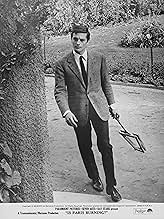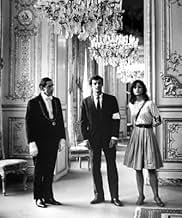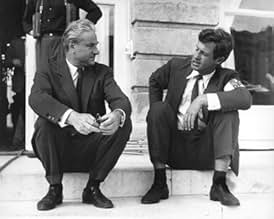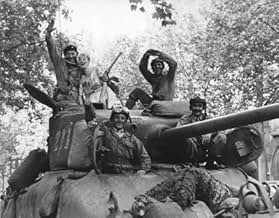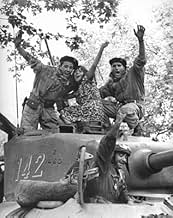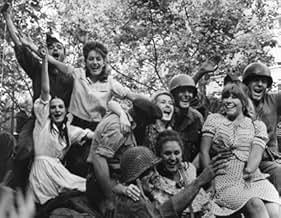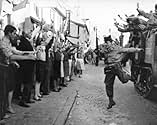CALIFICACIÓN DE IMDb
6.8/10
5.4 k
TU CALIFICACIÓN
La salida del ejército alemán de París en 1944.La salida del ejército alemán de París en 1944.La salida del ejército alemán de París en 1944.
- Dirección
- Guionistas
- Elenco
- Nominado a 2 premios Óscar
- 4 nominaciones en total
George Chakiris
- GI in Tank
- (as Georges Chakiris)
Gert Fröbe
- General Dietrich von Choltitz
- (as Gert Froebe)
Opiniones destacadas
Although Hitler somehow survived the failed July assassination attempt his paranoia increased. One of the few high-ranking officers he felt he could still trust was Dietrich von Choltitz. He had served Hitler well and was an officer who could be relied upon to obey orders implicitly. Hitler appointed him Governor-General of Paris with instructions to restore order and if need be destroy Paris rather than let it fall into Allied hands. Every bridge and monument was mined. This and the general insurrection led by the French Communist Party combined to make this a momentous and perilous time in the history of the French capital. As the Allies approached, von Choltitz rescinded Hitler's order. Seventy-five years on it is almost impossible to appreciate just how close Paris came to total destuction.
These events should, in theory anyway, provide sufficient material for a first-class movie, especially with René Clément at the helm.
In reality alas the film is a dud. One can try and find reasons. Personally I think it is down to a variety of factors: at a little under three hours it rambles; the newsreel footage is far more interesting and thrilling than the filmed action; there is an irritating mish mash of accents with some decidedly dodgy dubbing; there are too many writers and far too many famous faces. One critic at the time observed that the flames were extinguished by the shower of stars! The performance that stands out is that of Orson Welles as Swedish Consul Raoul Nordling, an unsung hero whose diplomatic relationship with von Choltitz assuredly influenced the latter's thinking. This relationship is very well depicted in Volker Schloendorff's film 'Diplomacy' with Niels Arestrup and Andre Dussollier as General and Consul.
The scene that really packs a punch is the sight and sound of the bell of Notre Dame which had been silenced for over four years. This is especially poignant in light of the recent fire that engulfed this monumental edifice. Clement has also included a rendition of 'La Marseillaise' which never fails to move. Needless to say the film was a tremendous success in France and Maurice Jarre's rather hurdy-gurdy 'Paris Waltz' theme extremely popular in its own right. Big budget plus well known actors equals great film? In this case decidedly not. Strange indeed that 'The Longest Day' which had no less than five directors, seems to work better than this with just the one. The real star of course is Paris itself.
These events should, in theory anyway, provide sufficient material for a first-class movie, especially with René Clément at the helm.
In reality alas the film is a dud. One can try and find reasons. Personally I think it is down to a variety of factors: at a little under three hours it rambles; the newsreel footage is far more interesting and thrilling than the filmed action; there is an irritating mish mash of accents with some decidedly dodgy dubbing; there are too many writers and far too many famous faces. One critic at the time observed that the flames were extinguished by the shower of stars! The performance that stands out is that of Orson Welles as Swedish Consul Raoul Nordling, an unsung hero whose diplomatic relationship with von Choltitz assuredly influenced the latter's thinking. This relationship is very well depicted in Volker Schloendorff's film 'Diplomacy' with Niels Arestrup and Andre Dussollier as General and Consul.
The scene that really packs a punch is the sight and sound of the bell of Notre Dame which had been silenced for over four years. This is especially poignant in light of the recent fire that engulfed this monumental edifice. Clement has also included a rendition of 'La Marseillaise' which never fails to move. Needless to say the film was a tremendous success in France and Maurice Jarre's rather hurdy-gurdy 'Paris Waltz' theme extremely popular in its own right. Big budget plus well known actors equals great film? In this case decidedly not. Strange indeed that 'The Longest Day' which had no less than five directors, seems to work better than this with just the one. The real star of course is Paris itself.
I made my first trip to Paris this past year. There are remembrances of World War Two on nearly every street corner, plaques with the names of resistance fighters who died during the war and during the Liberation. And France's military history is also on display, from monuments to Louis XIII, to Napoleon, and to their Tomb of the Unknown Soldier at the Arc de Triomphe. As Americans we forget sometimes that the French army lost millions during World War One, and struggled with how to fight the Second World War. Losing Paris was a humiliating defeat that the Free French army needed desperately to avenge. This film does a pretty engaging job of telling the story from a French point of view. Like many war films from the time it's a little too long, some celebrity cameos are miscast, and some facts and events are abridged. But unlike some other films from the period, it has some humor, and some great pathos. There's also great footage of the real liberation intercut with the narrative. If you've ever been to Paris, it's a beautiful travelogue of all the famous public spaces, seen through eyes from 1945 and 1966. I can only imagine seeing it in widescreen, and I hope to get a non-dubbed version soon.
In August 1944, Adolf Hitler assigns General Dietrich von Choltitz (Gert Froebe) to be in the military governor of Paris and to burn the city in case of the Allied forces arrival. Meanwhile, the French resistance has internal fights of the different factions and leaderships. One French major convinces the Allied forces to liberate Paris from the Germans. General von Choltitz disobeys Hitler's orders and spares Paris from destruction.
"Paris brûle-t-il?", a.k.a. "Is Paris Burning?", is an underrated French super production about the liberation of Paris in World War II. It is impressive the number of stars in this movie, directed by René Clément; screenplay by Francis Ford Coppola; music by Maurice Jarre. There are many cameos of great actors and also a huge number of bit players. Unfortunately the dubbing in English is awful. Fortunately this German general did not destroy one of the most beautiful cities in the world. My vote is eight.
Title (Brazil): "Paris Está em Chamas?" ("Is Paris Burning?")
"Paris brûle-t-il?", a.k.a. "Is Paris Burning?", is an underrated French super production about the liberation of Paris in World War II. It is impressive the number of stars in this movie, directed by René Clément; screenplay by Francis Ford Coppola; music by Maurice Jarre. There are many cameos of great actors and also a huge number of bit players. Unfortunately the dubbing in English is awful. Fortunately this German general did not destroy one of the most beautiful cities in the world. My vote is eight.
Title (Brazil): "Paris Está em Chamas?" ("Is Paris Burning?")
This film is a very well done dramatisation of the account of the liberation of Paris in August of 1944.History buffs take note;notice the mascot names of the tanks in General Leclerc's Free French armoured division.Many had Spanish names such as "Madrid" "Teruel" & "Zaragosa" as these vehicles were manned by anti-Fascist Spanish refugee fighters who played a largely important yet mostly un-acknowledged part largely ignored by mainstream historians about the WW2 period.
This is a good movie, but only if you have read the book. Otherwise, it would appear to be muddled and difficult to follow. There were so many different resistance factions operating in Paris at the time of the liberation it is difficult to keep them straight. The movie doesn't help you in that regard. Reading the book gives you a much better perspective on the part each faction played in the liberation.
The little vignettes you see with characters appearing in the film for only a few minutes are all true. Unfortunately, they don't always make sense to an uninformed viewer and they give the viewer the sense of a badly edited film.
The true story of the last few days before the liberation is extremely remarkable. Hitler sent a hard core general he trusted to destroy Paris. It is incredible that he disobeyed orders and saved the city.
What I really loved about the movie was the city itself. It is one of the most beautiful cities in the world. The film was shot mostly in the actual locations where the events portrayed took place. As a lover of history, I have been fortunate to have visited Paris more than once and walked these locations fully aware of what happened there. That makes this movie special for me. But, the film does have problems.
Besides being a bit disjointed, the French and German dialog were dubbed in English. It would have been better with subtitles, although many of the same actors did their own English dubbing. The film is in black and white, which doesn't bother me, but it might have been better in color. One of the main reasons for B&W was the Nazi flags. The French authorities refused to allow red and black Nazi flags to fly in Paris, even for a movie. They agreed only to have black and gray flags. But the black and white filming also allowed the blending of authentic war footage with the movie. Also remember that another similar film, The Longest Day, was shot a couple of years earlier in B&W.
The film is filled with a small army of great international actors. That was fun, although I didn't buy Kirk Douglas as General Patton. Gert Frobe (Goldfinger) was excellent as the German general in charge of Paris and Charles Boyer was also excellent in his small role. The music was composed by Maurice Jarre and is just wonderful. Whenever I am in Paris, the music continually runs through my head. As a side note, Jarre obviously borrowed much of this soundtrack for use in "Grand Prix".
In short, this is a historical movie rather than a great film. I recommend you read the book to get the full impact of the movie. But understand this remarkable story of the liberation is stranger than fiction, which makes it a good read. And, if you ever visit Paris the movie will take on a whole new perspective.
The little vignettes you see with characters appearing in the film for only a few minutes are all true. Unfortunately, they don't always make sense to an uninformed viewer and they give the viewer the sense of a badly edited film.
The true story of the last few days before the liberation is extremely remarkable. Hitler sent a hard core general he trusted to destroy Paris. It is incredible that he disobeyed orders and saved the city.
What I really loved about the movie was the city itself. It is one of the most beautiful cities in the world. The film was shot mostly in the actual locations where the events portrayed took place. As a lover of history, I have been fortunate to have visited Paris more than once and walked these locations fully aware of what happened there. That makes this movie special for me. But, the film does have problems.
Besides being a bit disjointed, the French and German dialog were dubbed in English. It would have been better with subtitles, although many of the same actors did their own English dubbing. The film is in black and white, which doesn't bother me, but it might have been better in color. One of the main reasons for B&W was the Nazi flags. The French authorities refused to allow red and black Nazi flags to fly in Paris, even for a movie. They agreed only to have black and gray flags. But the black and white filming also allowed the blending of authentic war footage with the movie. Also remember that another similar film, The Longest Day, was shot a couple of years earlier in B&W.
The film is filled with a small army of great international actors. That was fun, although I didn't buy Kirk Douglas as General Patton. Gert Frobe (Goldfinger) was excellent as the German general in charge of Paris and Charles Boyer was also excellent in his small role. The music was composed by Maurice Jarre and is just wonderful. Whenever I am in Paris, the music continually runs through my head. As a side note, Jarre obviously borrowed much of this soundtrack for use in "Grand Prix".
In short, this is a historical movie rather than a great film. I recommend you read the book to get the full impact of the movie. But understand this remarkable story of the liberation is stranger than fiction, which makes it a good read. And, if you ever visit Paris the movie will take on a whole new perspective.
¿Sabías que…?
- TriviaOne of the main reasons for the movie being filmed in black and white: the French authorities refused to allow red and black Nazi flags to fly in Paris, even for a movie. They agreed only to the use of black and gray Nazi flags.
- ErroresJudging by Choltitz's own memoirs ('Soldat enter Soldaten", 1951) there never was an order to deliberately destroy Paris or its monuments. The orders concerned laming industrial plants, blowing bridges, crushing uprisings, and defending the town as a fortress, accepting collateral damage. Choltitz later found out these orders were addressed to his superiors, not to him. He does mention Hitler asking "Is Paris burning?" but says he was informed of this by others, whose names he does not give.
- Citas
Lieutenant Henri Karcher: [over the phone to his father] Hello, Papa? This is Lieutenant Karcher. Your son. In spite of your pessimstic view of my military career, I'd like to announce I've just made some prisoners of the general in command of Paris at the Hotel Meurice. He surrendered to me. But I'm still very bad at drill.
- Créditos curiososThe end credit sequence is in color.
- ConexionesFeatured in Magician: The Astonishing Life and Work of Orson Welles (2014)
Selecciones populares
Inicia sesión para calificar y agrega a la lista de videos para obtener recomendaciones personalizadas
- How long is Is Paris Burning??Con tecnología de Alexa
Detalles
- Fecha de lanzamiento
- Países de origen
- Idiomas
- También se conoce como
- Is Paris Burning?
- Locaciones de filmación
- Rue de la Huchette, Paris 5, París, Francia(barricades)
- Productoras
- Ver más créditos de la compañía en IMDbPro
- Tiempo de ejecución2 horas 55 minutos
- Color
- Relación de aspecto
- 2.35 : 1
Contribuir a esta página
Sugiere una edición o agrega el contenido que falta

Principales brechas de datos
By what name was ¿Arde París? (1966) officially released in India in Hindi?
Responda
![Ver Bande-annonce [OV]](https://m.media-amazon.com/images/M/MV5BOWYyYzkwZTEtOTI4YS00NzFjLWI0ZmYtM2E1N2RiYTk2ZmNkXkEyXkFqcGdeQXRyYW5zY29kZS13b3JrZmxvdw@@._V1_QL75_UX500_CR0)
